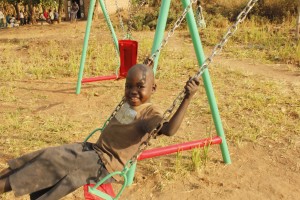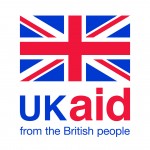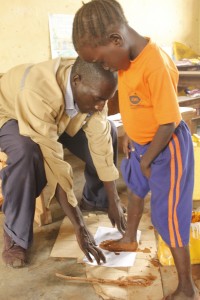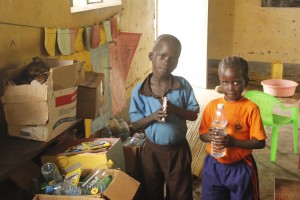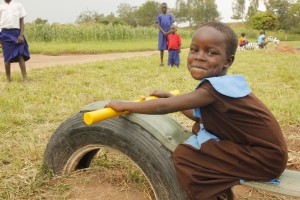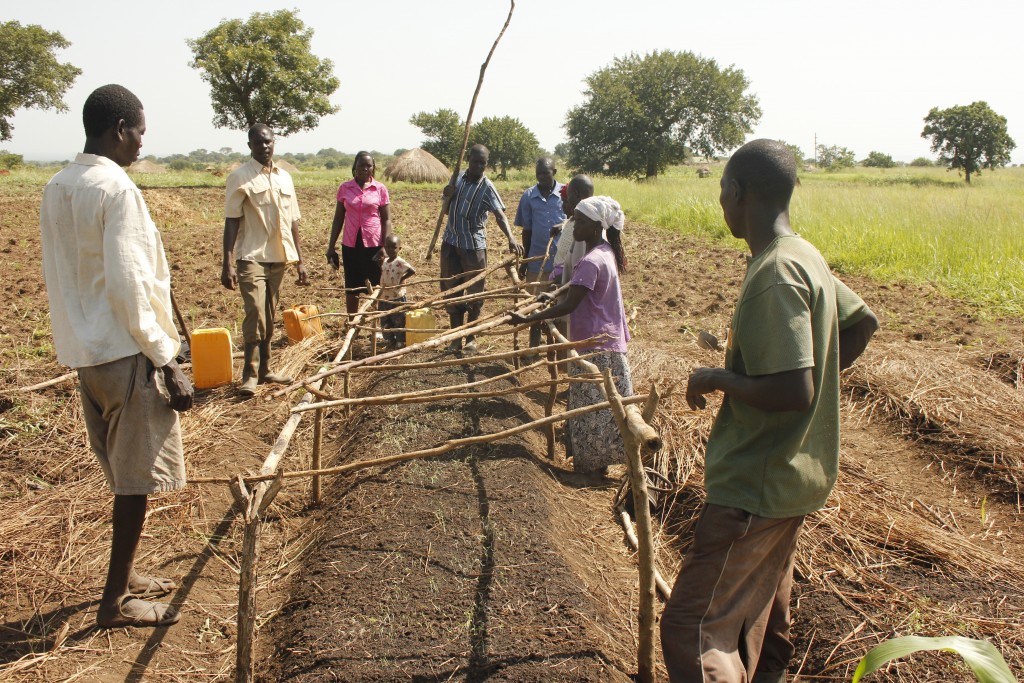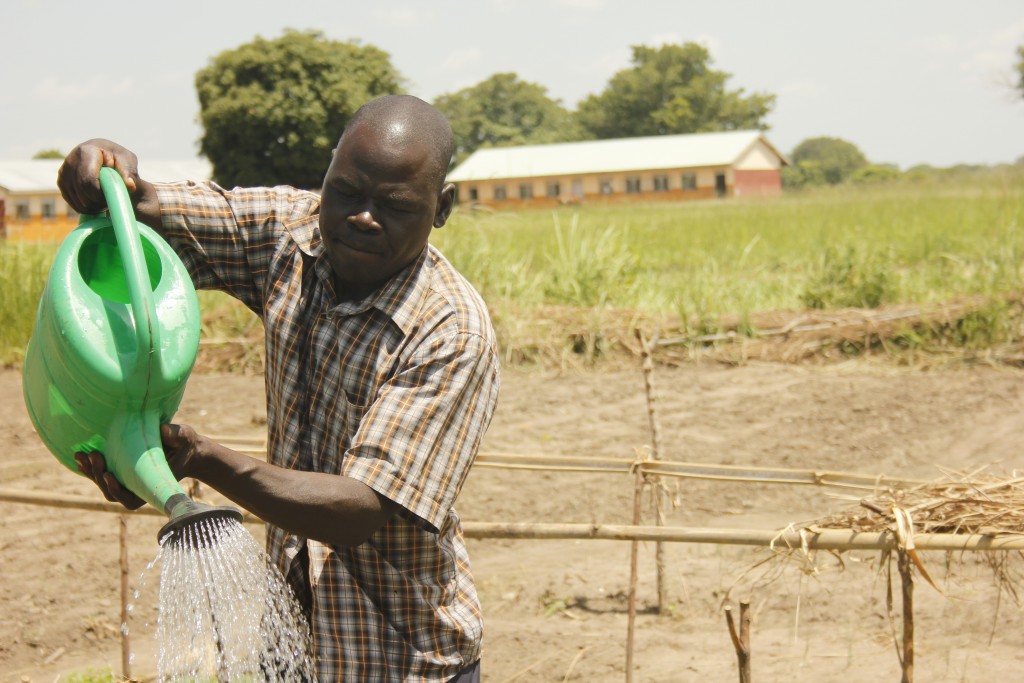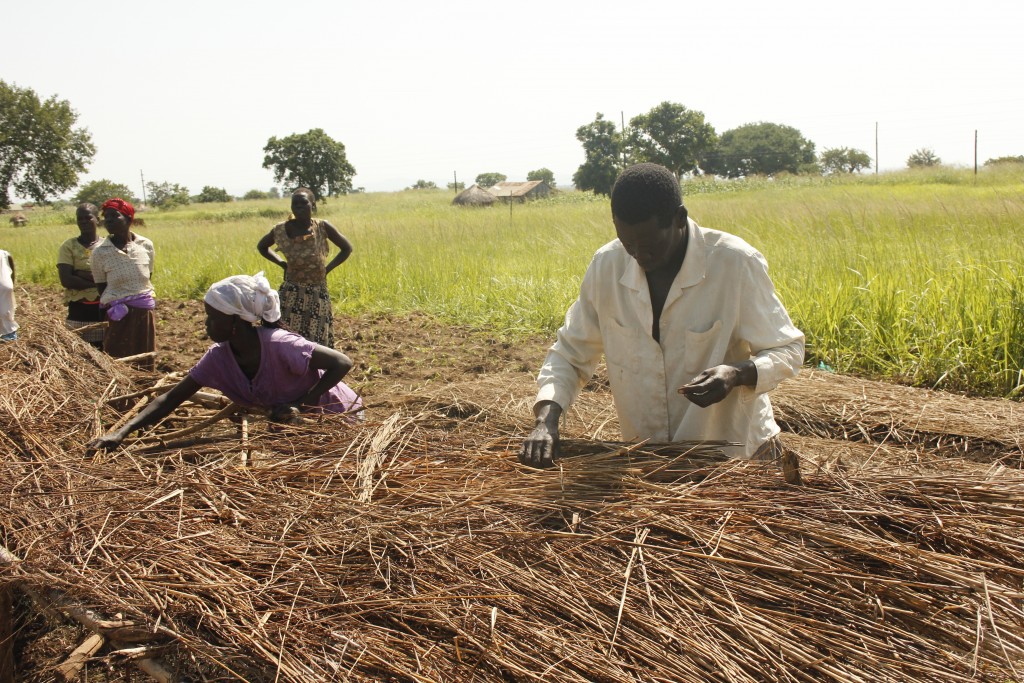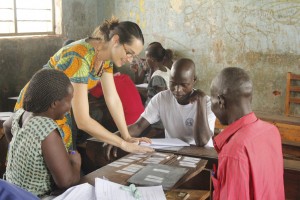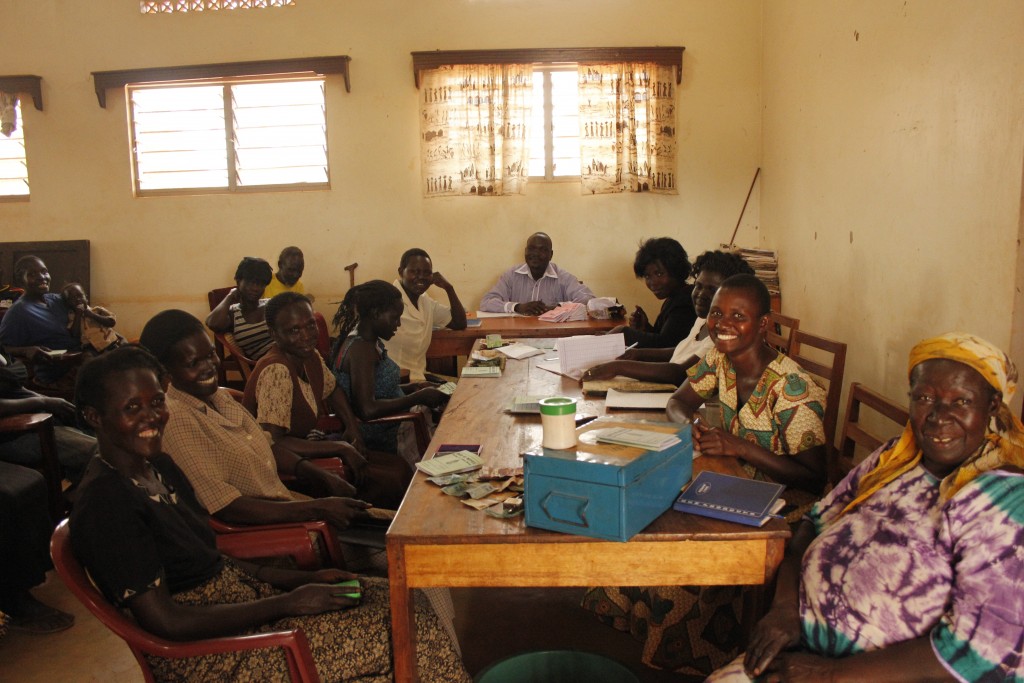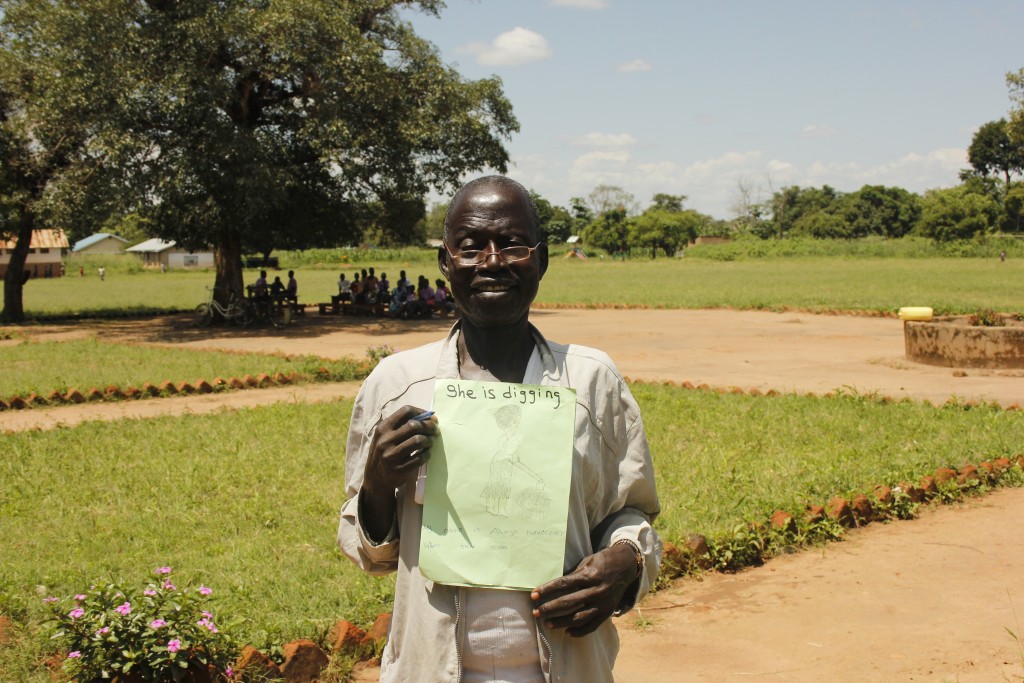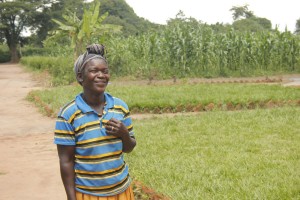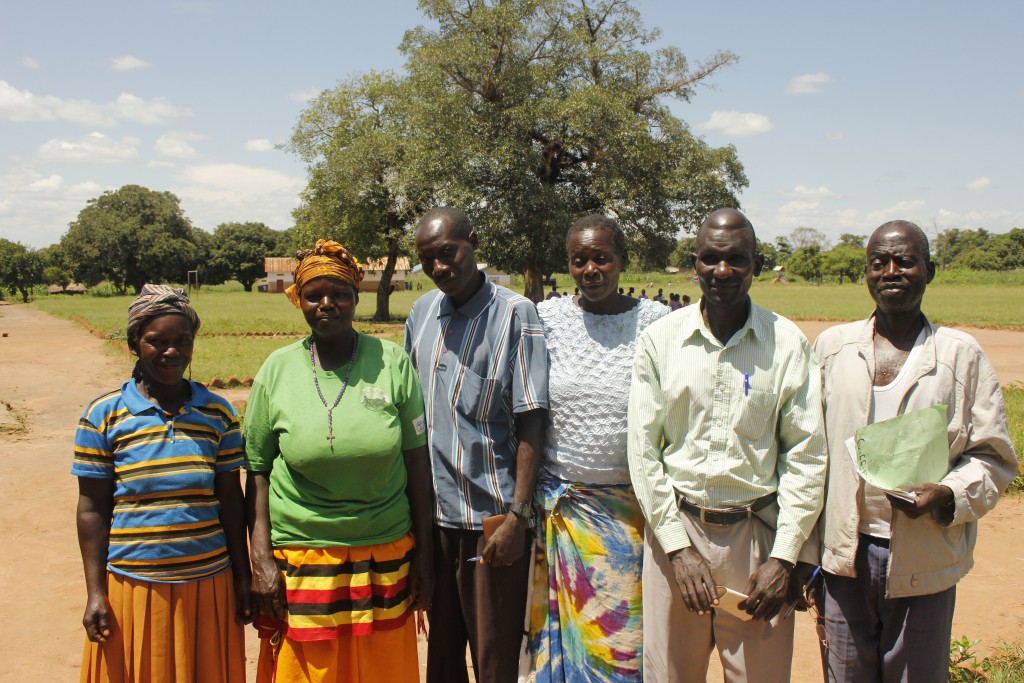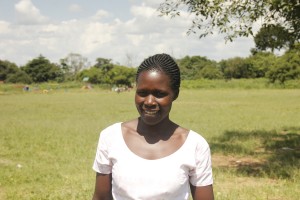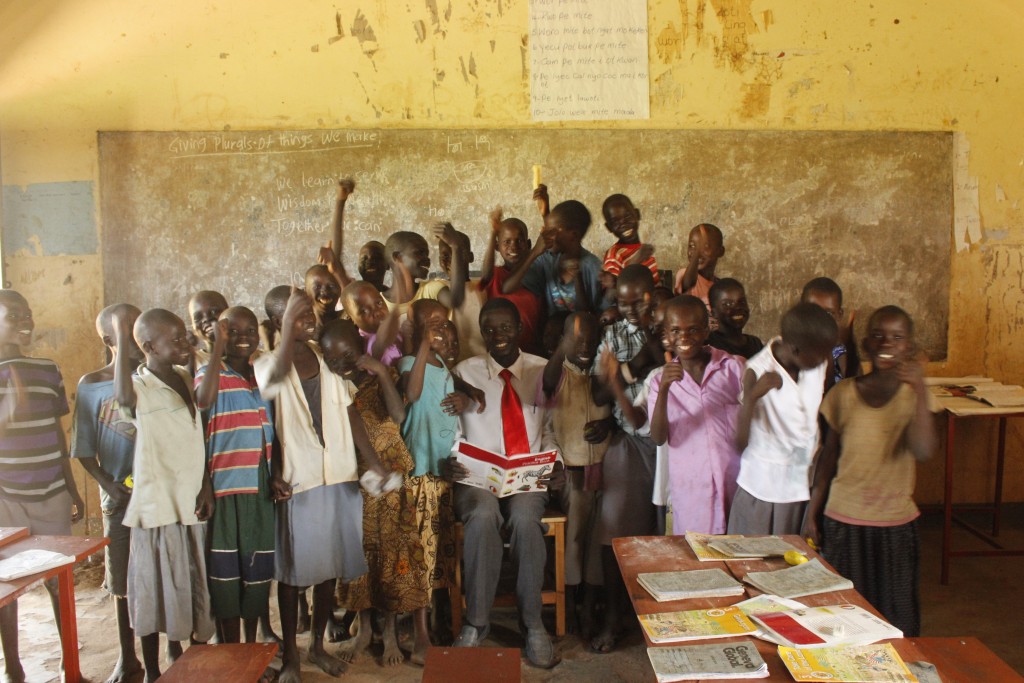New classrooms
July 25, 2016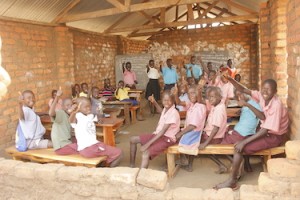 Thanks to our wonderful supporters in the UK, we have also raised enough money for new classroom blocks at Koch Lila primary school and Lacek community school.
Thanks to our wonderful supporters in the UK, we have also raised enough money for new classroom blocks at Koch Lila primary school and Lacek community school.
Whenever we help schools with a new construction, we always ask the school community to make some contribution – according to what they can afford.
We visited both schools and found parents at Lacek community school have already bought sand to make mortar. And at Koch Lila, parents have made 15,000 bricks – almost enough for the whole construction!
Posted in News | Leave a commentNew latrines
July 25, 2016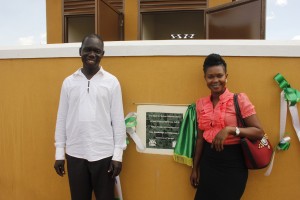 Back in May, we handed over a new latrine block to Teddi Community School in Northern Uganda. As a community school Teddi was set up and run by parents and receives no support from the Government. But last year, pupils at Teddi performed better than those from the local Government school!
Back in May, we handed over a new latrine block to Teddi Community School in Northern Uganda. As a community school Teddi was set up and run by parents and receives no support from the Government. But last year, pupils at Teddi performed better than those from the local Government school!
Posted in News | Leave a comment
Children speed through P1
July 25, 2016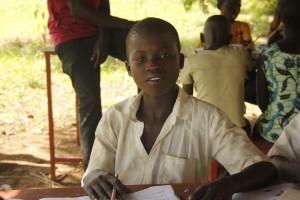 Our 30 Speed School classes in Northern Uganda are taking over 700 children through the first three years of primary school in just one year! So far this year, 733 children have sped through the curriculum for the first year of primary school. And in June, they started the curriculum for Primary 2. By the start of the next academic year in 2017, they will be able to join Year 4 of mainstream primary school.
Our 30 Speed School classes in Northern Uganda are taking over 700 children through the first three years of primary school in just one year! So far this year, 733 children have sped through the curriculum for the first year of primary school. And in June, they started the curriculum for Primary 2. By the start of the next academic year in 2017, they will be able to join Year 4 of mainstream primary school.
Learning to read
July 25, 2016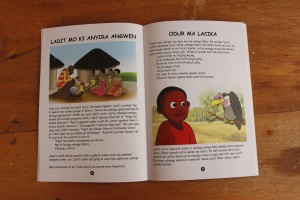 There is a strong story telling culture in Northern Uganda and to encourage reading in our nursery education work, we have developed a colourful book of traditional Acholi folk stories for teachers to read with their pupils. We also created 7 reading books for children, each covering a different topic like what we wear, transport, and places in our community. Each book is printed in English and in Acholi so children learn to read in both languages. We have printed 250 reading books and 60 traditional folk storybooks, which we will distribute to our 10 partner nursery schools. But more are available to order for other schools and organisations to use!
There is a strong story telling culture in Northern Uganda and to encourage reading in our nursery education work, we have developed a colourful book of traditional Acholi folk stories for teachers to read with their pupils. We also created 7 reading books for children, each covering a different topic like what we wear, transport, and places in our community. Each book is printed in English and in Acholi so children learn to read in both languages. We have printed 250 reading books and 60 traditional folk storybooks, which we will distribute to our 10 partner nursery schools. But more are available to order for other schools and organisations to use!
5 benefits of play for Early Childhood Development
July 15, 2016
Much of a child’s early years are spent playing, exploring and testing their environment and own personal boundaries. All of this play has significant and proven benefits for a child’s early development. Research has shown that children who regularly engage in play-based learning have better cognitive flexibility, working memory and self-regulation ability.
Here at African Revival, we recognise the immense benefits of play-based learning and have incorporated it as one of the major elements of our jumpstart! nursery education programme. In our 10 jumpstart! schools, we are building playgrounds, training teachers in how to guide play-based learning and make their own play materials using natural materials, and even teaching parents how to encourage productive play at home. We know that play is incredibly important for early childhood development – but what exactly are the top benefits?
- Better behaviour
Children behave better in the classroom when they have had the chance to blow off steam and release energy on the playground during the day. Playing is a known method of stress release that can help with a child’s emotional welfare, as nursery teacher Gino, from Purongo Hill Primary School in Nwoya district says: “the playground is where the children release their stress and refresh their minds between learning”
- Good social skills
Play can help young children become more aware of other people’s feelings and develop empathy. During play, whether it is inside or outside of the environment, children must interact and cooperate with each other, as well as share play equipment which requires good communication skills. Children can build relationships, learn to resolve conflicts, negotiate and regulate their emotions and behaviors. According to nursery teacher Gino, increased play-based learning at Purongo Hill has “eliminated that spirit of being selfish, and also helping the children with sharing because of that thing of collaboration”
- Improves academic performance
In 2009, research from the American Journal of School Health found that the more physical activity tests children can pass, the more likely they are to do well on academic tests. According to psychologist Kathryn Hirsch Pasek, “Children learn to count when they’re doing hopscotch […] They are telling stories on the playground, and they’re getting active.”
Furthermore, play can nurture qualities like self-discipline and attentional control, which can be just as vital for school readiness as content knowledge. Children with longer attention spans and self-control can focus more on tasks in the classroom. This is because when children engage in make-believe play that involves role playing, there are generally rules that they must follow which involves regulating their natural self and behavior. By practicing this in a safe, fun environment, their self-control is enhanced, which can then be transferred to a classroom setting.
- Language development
Moreover, make-believe play that involves role playing can also help children to develop their language skills, as was shown in a British study (Lewis, 2000). Infant pupils were asked to engage in symbolic play, whereby they use objects, actions or ideas to represent other objects, actions or ideas. For example, a child may put a wooden block to her ear as a pretend mobile phone. Children who scored higher on a test of symbolic play had better language skills, both in terms of what they understood and spoke. This suggests that play helps to develop and solidify language skills.
- Increases enthusiasm for learning
In northern Uganda, where drop out rates amongst primary school students are very high, play-based learning can encourage pupils to stay in school and attend more frequently. Indeed, at Purongo Hill Primary School in Nwoya district, nursery teacher Gino says that enrolment has skyrocketed since African Revival constructed a playground at the school (from 30 pupils in the nursery section to 120): “the playground has been an advantage to us because it has drawn in children, increased enrolment and reduced drop outs”.
Posted in News | Tagged Acholi, African Revival, Development, ECD, Headteacher, inspiration, Inspiring Head Teacher, International Development, Jumpstart!, play, Teacher training, Uganda | Leave a comment
Farming for Education
June 17, 2016More than 80% of Ugandans rely on agriculture to earn a living. Most are subsistence farmers, especially in Northern Uganda. As part of our School Demonstration Gardens, African Revival trains subsistence farmers in new farming techniques on a plot of land near school. This helps farmers improve their productivity at home. But it also brings parents closer to their children’s school. While working on the school garden, parents can also save their money in a Village Savings and Loans Association – which helps them pay school fees on time.
When we asked parents the benefit of the School Demonstration Garden, many spoke about bringing parents closer to the school and creating good relationships between parents, teachers and school management.
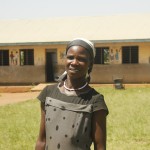 “We used to have a kind of fear between teachers and parents – parents would fear teachers and teachers would fear parents. But now there is good contact between teachers and parents, where teachers even tell us the weaknesses of our children”
“We used to have a kind of fear between teachers and parents – parents would fear teachers and teachers would fear parents. But now there is good contact between teachers and parents, where teachers even tell us the weaknesses of our children”
said Christine, a parent at Pawel Langetta Primary School
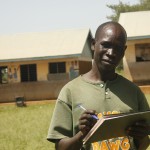 “Our coming to school has made us known to the teachers. Now teachers know which child belongs to which parent. Where the child goes wrong, the teacher can contact the parent directly. If your child is not performing, the teacher will come to you directly as the parent” said Bosco, a parent at Pawel Langetta and Chairperson of the School Demonstration Garden.
“Our coming to school has made us known to the teachers. Now teachers know which child belongs to which parent. Where the child goes wrong, the teacher can contact the parent directly. If your child is not performing, the teacher will come to you directly as the parent” said Bosco, a parent at Pawel Langetta and Chairperson of the School Demonstration Garden.
Parents also talk about being able to monitor their children at school while they are working in the School Demonstration Garden.
 “Some children would leave school early. But now we are working in the garden at school, there’s no way for children to escape school because they know their parents are there. So they stay in school all day long and attend all school activities” said Edward, a parent at Pawel Langetta Primary School.
“Some children would leave school early. But now we are working in the garden at school, there’s no way for children to escape school because they know their parents are there. So they stay in school all day long and attend all school activities” said Edward, a parent at Pawel Langetta Primary School.
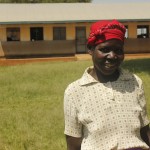 “Some pupils hid out behind buildings when they came to school and skipped class. But now the parents come to school, pupils worry their parents will see them loitering so they go to class”
“Some pupils hid out behind buildings when they came to school and skipped class. But now the parents come to school, pupils worry their parents will see them loitering so they go to class”
said Jessica, also a parent at Pawel Langetta
And finally, with a better relationship between the parents and the school, parents understand how they can best support their children in school.
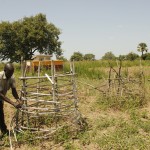 “As a group, we decided to pay the exam fees for all of our children out of the money we saved in the VSLA” said Anthony, a parent at Labala Primary School and Chairperson of the Labala School Demonstration Garden
“As a group, we decided to pay the exam fees for all of our children out of the money we saved in the VSLA” said Anthony, a parent at Labala Primary School and Chairperson of the Labala School Demonstration Garden
“My child’s punctuality has improved because I come to school early to work in the School Demonstration Garden and I never leave my child behind. And when my child gets out of class, I always buy something for her lunch so she’s not hungry when she goes back” said Jessica
Our School Demonstration Garden aims to bring together livelihoods and education – by training parents to improve their agricultural productivity and income at home, and also encouraging support for their children’s education. You can find out more about the School Demonstration Garden project here: https://africanrevival.org/what-we-do/uganda/livelihoods
Posted in News | Leave a comment
Facts about phonics!
June 16, 2016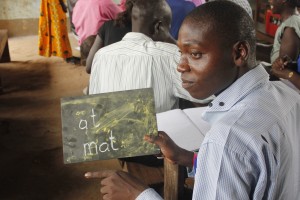 African Revival recently organised a 3- day phonics training for Koch Goma Primary School with phonics trainers Jody Spencer and Akello Catherine. Jody and Catherine used the Fun of Phonics curriculum, which has been adapted by Jody from international phonics programmes to fit the local teaching environment in Uganda. Teachers were trained in a multisensory synthetics phonics approach using actions and song, and practiced using teaching methods such as pair reading.
African Revival recently organised a 3- day phonics training for Koch Goma Primary School with phonics trainers Jody Spencer and Akello Catherine. Jody and Catherine used the Fun of Phonics curriculum, which has been adapted by Jody from international phonics programmes to fit the local teaching environment in Uganda. Teachers were trained in a multisensory synthetics phonics approach using actions and song, and practiced using teaching methods such as pair reading.
But what is phonics? How is it different from teaching children to read using the rote memorization technique? And why is it so effective? Find out all you ever wanted to know about phonics here!
What is phonics?
Phonics is a method of teaching reading and writing that focuses on sounds. In the English language there are only 26 letters in the alphabet, however there are 44 sounds and 120 main ways of writing these sounds. Phonics teaches children to recognise and write these sounds by training them to correlate these different sounds (phonemes) with letters (graphemes).
Phonemes are the smallest units of sound that make up a word.
Take the word ‘star’. While it consists of only one syllable, it contains four different phonemes: /s/ /t/ /a/ /r/. When teaching phonics, children will be taught the sound each phoneme makes, then how to put these sounds together to sound out the whole word.
Some sounds have one letter, while others have two or three. For example, the word ‘fish’ has four letters but only three sounds – the letters ‘sh’ make one sound but are two letters.
Why is phonics an effective teaching method?
A written language is basically a kind of a code. Teaching phonics is just teaching children to crack that code by learning to recognize the sounds of letters and different letter combinations. Children learn the simple bits first and then easily progress to get the hang of the trickier bits. Phonics gives children the skills to decode new words that they have not been taught by sounding them out, therefore equipping them with the skills to read and write independently.
Yes. A study in the UK led by Educational Psychologist Marlynne Grant has shown the effectiveness of phonics instruction at nursery and primary level. The study followed a group of 30 children who were taught using phonics for the first time in nursery, and tracked their progress for three years, to the end of year two in primary school. Grant’s research found that in 2013, members of the year two class of seven-year-olds were on average 28 months ahead of their chronological age for reading and 21 months above their age for spelling.
Why is rote learning not effective?
Rote learning is a memorisation technique centred on repetition and cramming. It is based on the idea that the more a child repeats a piece of information, the quicker they will be able to recall it. However, this quick recall often comes at the expense of a deeper understanding because rote learning does not focus on comprehension.
In Uganda, pupils are often taught English using this rote learning method. Children are taught to repeat and memorize particular sentences and words, but are not taught how to decipher specific sounds in words. This means that some children can read words they have already been taught, but cannot tackle new words on their own. Other children, however, find it difficult to memorize words and can progress through primary school with a limited reading ability. Many children leave primary school without being able to read independently when taught using rote memorization.
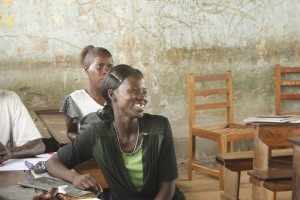 What are literacy levels in Uganda?
What are literacy levels in Uganda?
Across Uganda, one third of youth are illiterate and pass rates for English amongst children aged 10-16 are only 47% (Uwezo). In many schools, especially those in poorer rural areas, quality of education remains poor and teachers lack practical skills and educational resources. Many children leave school without the ability to read simple sentences that they have not already been taught.
Why does literacy matter?
Children’s poor skills in reading and writing have a direct result on their results in other academic subjects such as mathematics and science because the main academic language for exams in primary school is English. Children who cannot read and understand questions for these subjects often perform poorly in exams and do not develop literacy skills vital for success in the workplace and beyond.
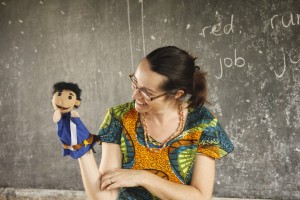 How can training teachers in phonics help improve literacy levels?
How can training teachers in phonics help improve literacy levels?
The root cause of illiteracy is the way teachers are trained in Uganda. In general, they are taught to use rote memorisation to train pupils to read and write, often graduating from Primary Teaching College without being confident in teaching English. In some rural schools, some teachers struggle with the English language themselves following years of poor instruction, so struggle to teach the language in the classroom. Moreover, they lack skills in effective, research-based teaching methods which engage learners. By training teachers in phonics methodology, they will be equipped with the skills to teach children how to decode new words and give them the framework to independently develop their literacy level. Strong literacy skills will help students to improve their performance in other subject areas, with general comprehension across subjects enhanced by the ability to read and write well.
Posted in News | Tagged African Revival, Changemaker, Development, ECD, Education, Gulu, inspiration, Inspiring Head Teacher, International Development, Jumpstart!, Nursery School, School Development, Teacher training | Leave a commentHow is Speed School addressing the root cause of school dropouts?
May 30, 2016One of the main reasons children drop out of school in Northern Uganda is that their parents cannot afford school fees. Although the Government of Uganda introduced free universal primary education, this money does not cover textbooks, pencils, uniform or school dinners. In addition, Government money often reaches schools months after it is due. The result of this is that Government schools usually ask parents to contribute. For subsistence farmers in rural, Northern Uganda, finding this contribution can be difficult.
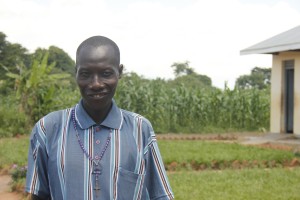 Bonnie is a parent in Northern Uganda and a local church leader.
Bonnie is a parent in Northern Uganda and a local church leader.
“I’m taking care of many children. I have some in primary and others in secondary and that takes a lot of money. So I had one staying at home until I could raise the money for his school fees.”
Bonnie’s situation is typical. Many parents take care of six or more children. And some children lost one or both parents during the insurgency by the Lord’s Resistance Army, which ended in 2006, and are now cared for by single parents or extended family.
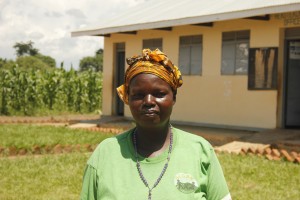 “Grandmothers take care of the children to their daughters and sons. Sometimes the sons have left, or sometimes the sons have divorced their wives. So Grandmothers are taking care of their children. But they cannot pay the school fees for all of their grandchildren so many are not enrolled in school”
“Grandmothers take care of the children to their daughters and sons. Sometimes the sons have left, or sometimes the sons have divorced their wives. So Grandmothers are taking care of their children. But they cannot pay the school fees for all of their grandchildren so many are not enrolled in school”
– Esther, a Grandmother and a member of the Speed School management committee.
To address families’ lack of money for school fees, African Revival helped Speed School parents set up self-help groups. In the self-help group, parents save their money in a Village Savings and Loans Association – a community saving club. Parents deposit a small amount of money each week and can also borrow money from the communal pot and repay it later with interest. Each group meets once a week during the time their children are in Speed School. By encouraging a culture of saving – and providing access to borrowing – Village Savings and Loans Associations help parents pay their children’s school fees on time. This helps break the cycle of absenteeism, where children miss a portion of term and fall too far behind to continue.
“When the VSLA is established, it will help these parents to sustain their children in school. Parents will be paying their children’s school fees through VSLA,” said Esther.
Because parents manage self-help groups, each group can decide if they wish to set up other activities to support the members. Some groups decide to set up income generating activities like farming, or selling crafts. Others use the self-help group as a forum to discuss challenges individual families are facing. From talking with parents in Northern Uganda, you can see they are impressed with Speed School and appreciate the second chance it is giving their children.
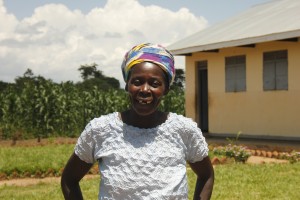 “When these children enrol in primary school [when Speed School has finished], they will have caught up with the rest because Speed School is taking them on a speedy process,” said Joice, a widow and mother of five children.
“When these children enrol in primary school [when Speed School has finished], they will have caught up with the rest because Speed School is taking them on a speedy process,” said Joice, a widow and mother of five children.
“Children are really appreciating the Speed School class and they say it is very interesting to study in Speed School,” said Alfred, a Speed School parent and member of the Speed School management committee.
Many parents have already seen great changes in their children since attending Speed School.
“My child used to wander around in the villages but these days he will come home with a storybook and he will sit at home reading,” said Betty, a mother of six children, one of whom is in Speed School.
“My child has changed a lot. He also used to wander around the villages but now when he comes home he can tell you what he has learnt and how he has been taken care of,” said Esther.
By involving parents in self-help groups, Speed School is helping parents generate income and save it towards school fees. The aim is for parents to be in a better position to support their children through school by the time they come to re-enrol in mainstream primary school.
Posted in News | Leave a comment
Meet Fielda and James: Speed School Facilitators
May 20, 2016Fielda and James are facilitators in African Revival’s new Speed Schools project. James completed a Diploma in Business Administration and was staying at home looking for work when this project started. He told African Revival about his role as a facilitator.
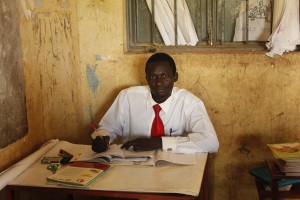 “I come to school every day from 8am to 5pm Monday to Friday and even on weekends if there is any weekend activity. You take 25 children age 9-14 years. If someone is missing school, I follow up and see the cause of them missing school. When I am teaching the children, I treat them as my own because I am responsible for their future.”
“I come to school every day from 8am to 5pm Monday to Friday and even on weekends if there is any weekend activity. You take 25 children age 9-14 years. If someone is missing school, I follow up and see the cause of them missing school. When I am teaching the children, I treat them as my own because I am responsible for their future.”
Fielda was a Grade 1 teacher at Wilacic Primary School. She had never attended teacher training and she knew training as a facilitator would help her professional development.
“When I heard about the role of facilitator I knew I would be trained. With the training I could do a good job as a facilitator and as a teacher at this school when the project finishes.”
Facilitators undertake one week of intensive training before they start teaching. Like James, not all facilitators come from a teaching background. We look for someone from the local school community who can play a holistic role in their children’s education – liaising with parents and acting as a role model in the community as well as teaching a tough, condensed curriculum. Fielda says she learnt so many things from the training.
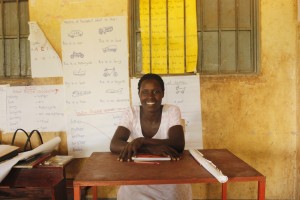 “It was the first time I learnt songs and rhymes that we can use in class. It was the first time I learnt how to make children sit well in the class, how to teach them, how to guide them. I also learnt how to associate with fellow colleagues.”
“It was the first time I learnt songs and rhymes that we can use in class. It was the first time I learnt how to make children sit well in the class, how to teach them, how to guide them. I also learnt how to associate with fellow colleagues.”
James said the training would stay with him his whole life.
“They took us through the process of child development from the womb up to adult. We learnt teaching methods and seating arrangements, and I learnt that a year’s curriculum can be condensed into three months if you are speedy and accurate.”
Although Speed School takes children up to age 14, many have never attended school before.
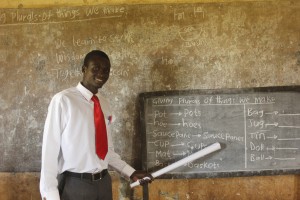 “In my class, sometimes I can be writing something and a child says ‘Sir, let me write that’ and I feel so glad because I know they have learnt. When you teach them, they remember tomorrow. Others already start thinking about a topic before you begin teaching it.”
“In my class, sometimes I can be writing something and a child says ‘Sir, let me write that’ and I feel so glad because I know they have learnt. When you teach them, they remember tomorrow. Others already start thinking about a topic before you begin teaching it.”
Through Speed Schools, facilitators have learnt activity-based learning.
“I always like music, nature and practical learning. This week we are learning about things we make, so we go outside and collect materials and when we come back to the class we make things like pots, and baskets.”
However Speed School is not without challenges. Both Fielda and James agree that teaching a condensed curriculum everyday from 8am to 5pm can be tiring for the children and the facilitators.
James said, “Every day you need to plan, you need to scheme and you need to teach 8 lessons. It’s hard to scheme 8, plan 8 and teach 8 each day. At least we were given a book of lesson plans, so I’m using that a lot.”
Fielda added, “There are also some people who think these children are wild. They look at them and they see no hope in them.”
But the parents are already seeing real changes in their children. And it is clear from talking to Fielda and James that they get a lot of personal satisfaction from seeing the children develop so quickly in knowledge, ability and confidence.
“What I enjoy most is when I come to school and I find the children are already waiting for me” says James
Both James and Fielda agree that those who think negatively about children who dropout will see the results of Speed School at the end of the year, when these children reenrol in mainstream primary school.
Posted in News | Leave a commentCan you help? We need motorbikes!
May 10, 2016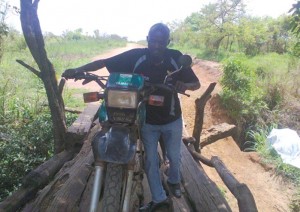 Adequate motorbike access is crucial to our work in Uganda. Motorbikes allow our field staff to travel to rural schools to implement and monitor our programmes and to maintain contact with the communities we work with.
Adequate motorbike access is crucial to our work in Uganda. Motorbikes allow our field staff to travel to rural schools to implement and monitor our programmes and to maintain contact with the communities we work with.
Motorbikes are the only reliable means of transport for our employees to get to these isolated schools, often located in very remote areas which lack basic road infrastructure.
The current lack of motorbikes for our field staff is limiting their ability to work with some schools, especially as we are now entering rainy season in Uganda.
We are seeking £6,187 to buy two motorbikes. With access to these vehicles, we can better reach all of our beneficiaries, as well as expand our support to schools further away.
If you can help, please get in touch on 020 8939 3190 or info@africanrevival.org
Posted in News | Leave a comment
